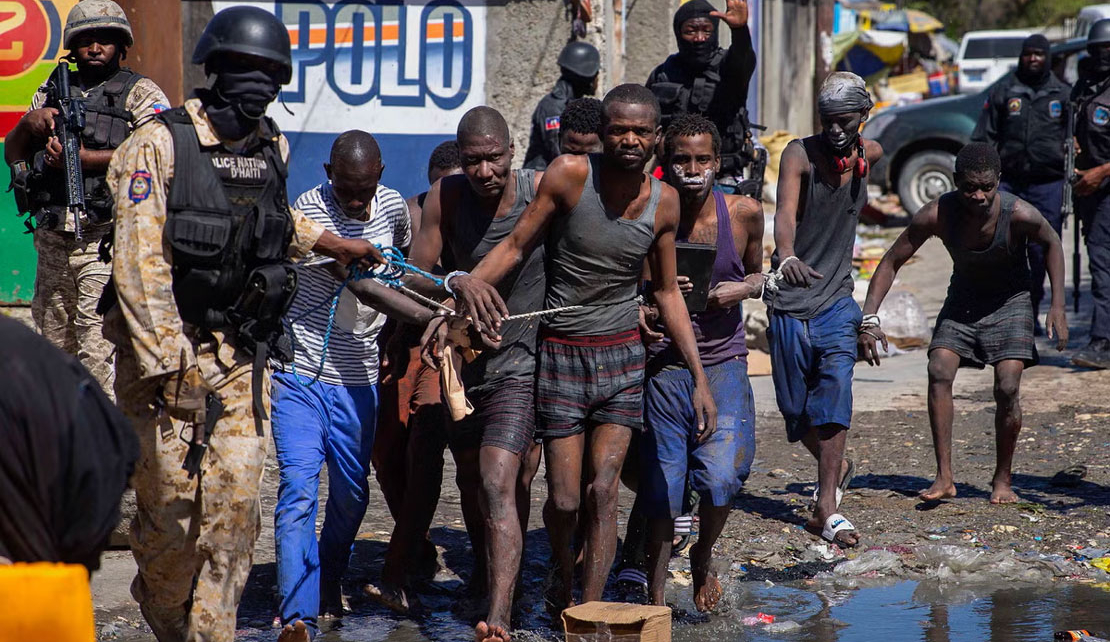HAITI getting worse, gangs control 80% of Port-au-Prince, 4000 prisoners escape

MONTEGO BAY, Jamaica, March 4, 2024 - United Nations Secretary-General António Guterres has again appealed for greater support for an international mission to help Haiti combat rampant gang violence.
He was on Friday addressing the summit of the Community of Latin American and Caribbean States (CELAC), which comprises more than 30 countries at their meeting in Saint Vincent and the Grenadines.
He warned that the already dire situation in Haiti is getting worse by the day, as gangs hold the country hostage and use sexual violence as a weapon.
Saturday saw a tumultuous event unfold as street gangs carried out a synchronized attack on Haiti’s largest prisons, resulting in the escape of almost all 4,000 inmates.
Haiti’s government declared a state of emergency and imposed a curfew after an explosion of gang-led violence over the weekend saw thousands of prisoners escape after assaults on the country’s two biggest prisons.
The 72-hour state of emergency went into immediate effect as the government said it would set out to find the killers, kidnappers and other violent criminals it said it had escaped in the attacks.
More than a dozen inmates have died, after the attack on a prison by criminal gangs seeking to overthrow the current de facto government of Prime Minister Ariel Henry.
Remarkably, 18 former Colombian soldiers linked to the assassination of Haitian President Jovenel Moise in July 2021 chose to remain behind.
This tragic incident triggered a surge in violence across the nation, with gangs now reportedly controlling around 80% of Port-au-Prince.
Following the prison raid, at least three deaths were reported, along with accounts of widespread violence within the facility.
The assault comes after one of Haiti’s most notorious criminals, Jimmy Chérisier (Barbecue), announced the beginning of a "revolution" against the PM’s government, Ariel Henry, who after participating in the CARICOM summit traveled to Kenya to sign a security treaty, and whose return has not been confirmed.
Simultaneously, gangs targeted government buildings near the prison, allegedly to prevent the return of Prime Minister Ariel Henry from Kenya.

Despite appeals for international aid, Haitian authorities have struggled to curb the violence, leading to the UN’s authorization of an international military force led by Kenya in October 2023.
Nevertheless, setbacks like Kenya’s constitutional ruling against the mission in January have impeded efforts to restore order, leaving Haitian leaders like Henry uncertain about the country’s future security.
The Bahamas, Bangladesh, Barbados, Benin, and Chad have officially informed the UN of their intention to provide men to an international force to assist the Haitian national police in combating armed gangs.
A trust fund to support the international security support operation has also received contributions totaling $10.8 million, U.N. spokesperson Stephane Dujarric informed reporters, adding that other commitments totaling $78 million have also been made.
Last October, the UN Security Council authorized a multinational security support mission to back-up the national police, which Kenya has offered to lead. Several countries, including CELAC members, made additional pledges of support during an event on the sidelines of the G20 meeting in Brazil last week.
Hundreds of inmates flee from Haiti's main prison after armed gangs storm the facility in overnight explosion of violence engulfing much of the capital Port-au-Prince pic.twitter.com/MVRvNRjkvs
— TRT World Now (@TRTWorldNow) March 3, 2024
“I welcome these efforts, but much more must be done to secure the deployment of this mission without further delay and a political solution that could resolve the country's fundamental problems,” he said.
According to news reports, Kenya and Haiti signed a formal security agreement on Friday which will allow the deployment of 1,000 Kenyan police officers which will form the core of the new UN-backed multinational mission.
Kenyan President William Ruto reportedly said that thanks to the breakthrough deal, the mission can now be fast-tracked. The bilateral agreement is a key pre-condition laid down by Kenya's High Court for allowing the police deployment.
The difficulty in locating a nation ready to spearhead a security aid operation caused a delay in responding to Haiti’s appeal for assistance. Kenya committed to providing 1,000 police last year, but the action was later halted by a local court for being unconstitutional. The proposal will proceed, according to Kenyan President William Ruto, although Guterres has not yet been informed.
Benin has stated it intends to deploy around 1,500 people, according to Dujarric. The number of soldiers offered by the remaining four countries was not immediately apparent.
The UN claimed separately that half of Haiti’s population, or around 5.5 million people, require humanitarian relief, and it is requesting $674 million in 2024. According to Ulrika Richardson, the UN’s Humanitarian Coordinator for Haiti, the organization barely got a third of the funding it requested last year.
CARICOM Heads at their meeting in Guyana last week, expressed their deep concern over the continued deterioration of the security, humanitarian and political situation and the continued delay in overcoming the political stalemate, which have blocked the possibility of free and fair elections.
The CARICOM Heads took note of the commitment made by Prime Minister Ariel Henry to major steps to move the political process forward, including the holding of general elections to restore constitutional government and authority no later than 31 August 2025.
To this end, an electoral needs gap assessment team will be dispatched by CARICOM by 31 March 2024, in consultation with the United Nations in line with existing Security Council mandates, with the support of Canada, USA and the OAS. The Assessment Team will support planning and efforts of the relevant Haitian institutions to be established.
-30-
